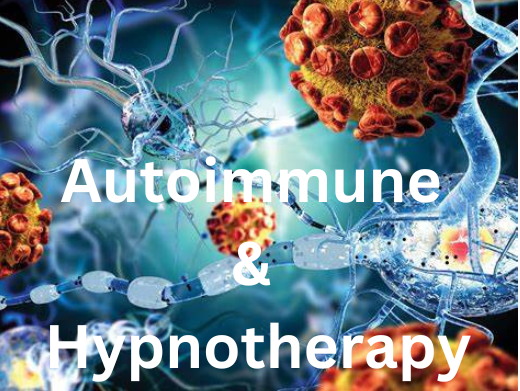I along with possibly you and approximately 1 in 10 people in the UK suffer from debilitating autoimmune conditions which are increasing in numbers all the time. Many of these autoimmune diseases share many similar symptoms.
There's no universally agreed-upon definition of an autoimmune disease, but there are many prevalent symptoms. that are common in many of the conditions. These include Fatigue, Pain, Depression, Skin Conditions, Self-esteem, Emotional Issues, Sleep Issues, Energy levels, and much more.
Hypnotherapy recognises there is a strong link between the mind and body and in autoimmune diseases they can often exacerbated by stress, which can weaken the immune system.
Anxiety is often a significant component of stress and research has demonstrated hypnosis's effectiveness in reducing anxiety symptoms. An example is studies on patients with anxiety disorders have shown that hypnosis can alleviate symptoms and improve quality of life.
How Hypnotherapy Can Help People Who Suffer
- Fatigue Management: fatigue can be debilitating. Hypnotherapy can help individuals develop strategies to conserve energy, improve sleep quality, and manage the overwhelming sensation of tiredness.
- Pain Reduction: Joint pain is a common symptom in autoimmune conditions. Hypnotherapy can help individuals manage pain by focusing on relaxation and distraction techniques.
- Skin Condition Management: While hypnotherapy won't directly affect the physical symptoms of skin conditions, it can help manage the emotional stress and anxiety associated with visible skin changes.
- Immune System Regulation: While the exact mechanism is still under investigation, some believe hypnotherapy can influence the body's stress response, potentially impacting the immune system.
- Coping with Emotional Challenges: Autoimmune conditions can be emotionally taxing. Hypnotherapy can help individuals develop coping mechanisms, reduce anxiety, and improve overall mental well-being.
Hypnotherapy Techniques :
- Progressive Muscle Relaxation: This technique involves tensing and relaxing different muscle groups to induce a deep state of relaxation.
- Visualization: Imagining a healthy and strong body can help reduce stress and promote healing.
- Anchoring: This involves creating a trigger (like a word or touch) to access a relaxed state quickly.
Hypnotherapy recognizes that there is a strong link between the mind and body and in autoimmune diseases they can often exacerbated by stress, which can weaken the immune system.
Hypnosis can induce a deep relaxation response, counteracting the body's stress response.
Stress often disrupts sleep, which is crucial for immune function recovery. Hypnotherapy can aid in better sleep patterns.
Hypnosis and Cortisol Levels:
- Studies have shown that hypnosis can significantly reduce cortisol levels, a key indicator of stress.
- Example: A study published in the International Journal of Clinical and Experimental Hypnosis found that hypnosis reduced cortisol levels in dental patients undergoing surgery.
Hypnosis and Anxiety Reduction:
- Anxiety is often a significant component of stress. Research has demonstrated hypnosis's effectiveness in reducing anxiety symptoms.
- Example: Studies on patients with anxiety disorders have shown that hypnosis can alleviate symptoms and improve quality of life.
Hypnosis and Sleep Improvement:
- Stress often disrupts sleep patterns. Hypnosis has been used successfully to improve sleep quality, indirectly reducing stress.
- Example: Research has shown that hypnosis can increase sleep duration and improve sleep quality in individuals with insomnia.

